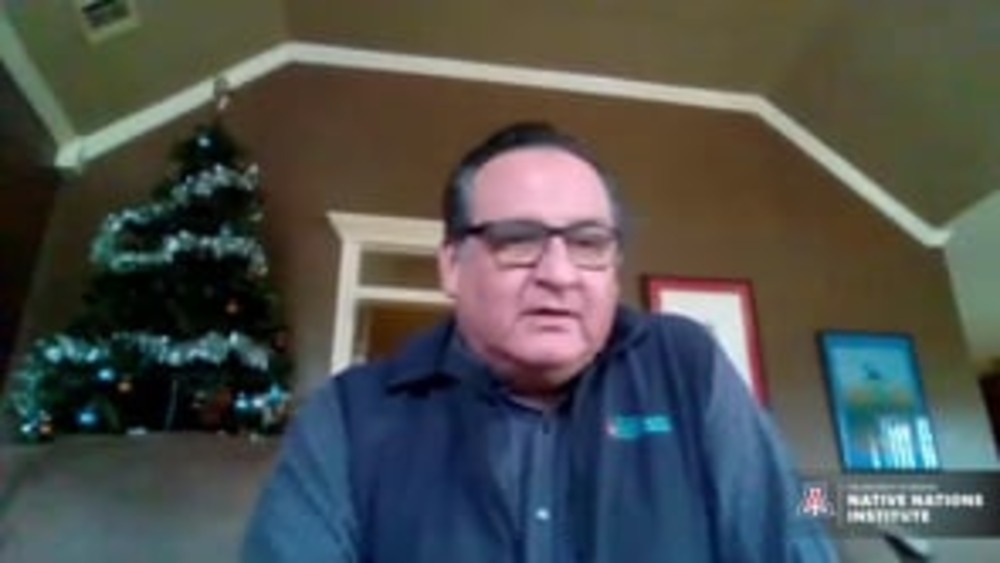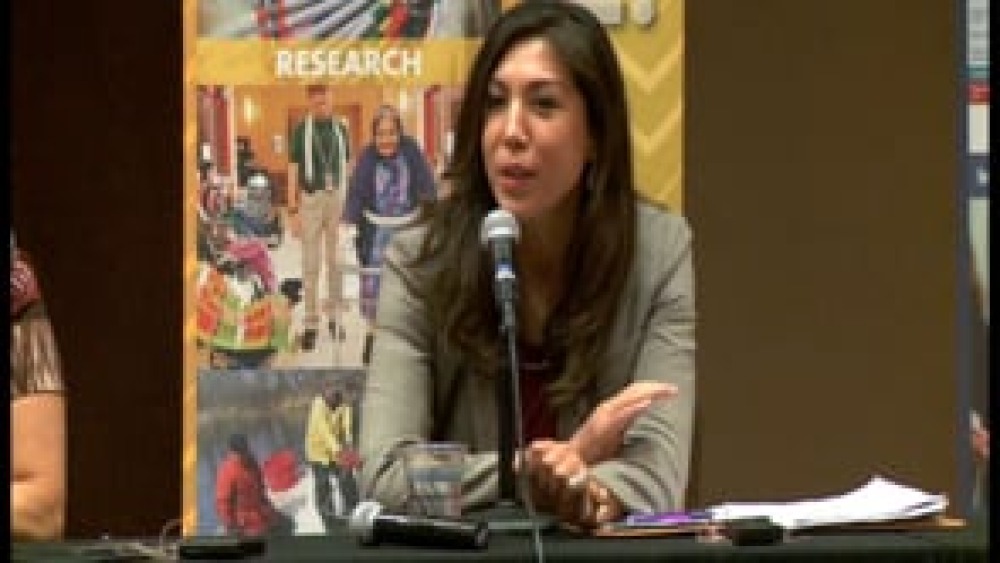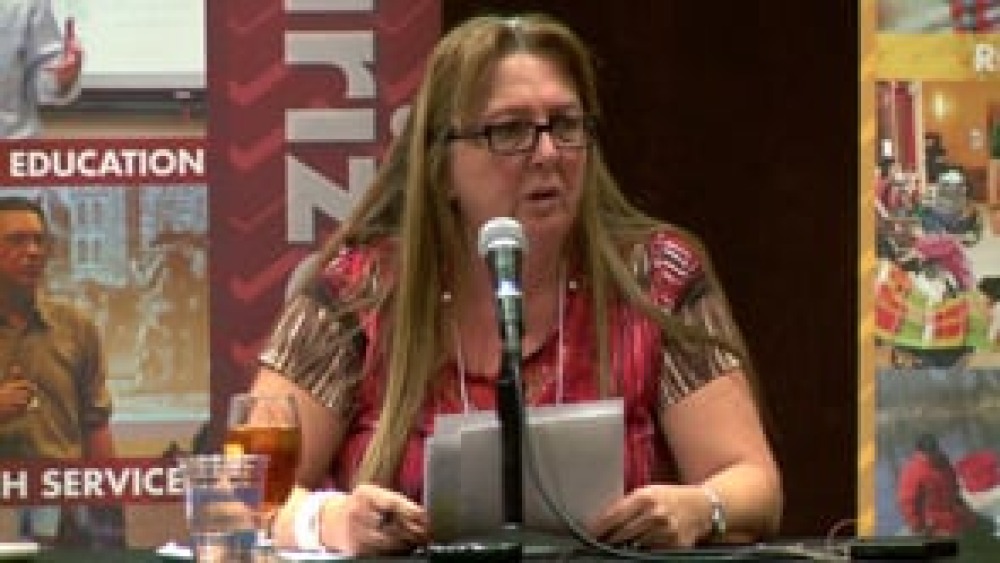Paulette Jordan and Arlene Templer field questions from the audience, offering more details about how they mobilized their fellow tribal citizens to buy into the community development initiatives they were advancing.
Additional Information
Jordan, Paulette. "Engaging the Nation's Citizens and Effecting Change (Q&A)." Emerging Leaders seminar. Native Nations Institute for Leadership, Management, and Policy, University of Arizona. Tucson, Arizona. November 7, 2013. Q&A session.
Templer, Arlene. "Engaging the Nation's Citizens and Effecting Change (Q&A)." Emerging Leaders seminar. Native Nations Institute for Leadership, Management, and Policy, University of Arizona. Tucson, Arizona. November 7, 2013. Q&A session.
Transcript
Herminia Frias:
"Well, thank you, Paulette and Arlene. We're going to open it up for questions, but I just wanted to make a comment from both of these stories is that these are really good stories about engaging the community and the citizenship about their responsibilities and the whole effective change and the process that it takes. None of this stuff happened overnight and what they did require that vision, that vision and that communication and going back and just keep on moving one at a time. And a lot of times when we work with tribal leaders it just seems like everything is so urgent and everything is so crisis-driven that sometimes it helps to take a step back and see how other tribes have done things and that it didn't happen overnight and as long as you continue to focus on that vision, you'll get there, just like they did. You'll get there and when you look back, you'll look at the process and think, ‘Wow, we did a lot.' And again, nations are not always good at giving themselves credit for the wonderful work that you do and that's one of the neat things that we get to do in our role is to be able to identify and look at that and meet people like Paulette and Arlene and say, ‘You've got to share your story because more people need to know about the process that you went through so that it inspires them to say we can do it, too.' So questions?"
Ian Record:
"Minnie, if you wouldn't mind, I'm going to actually ask the first question of Arlene. I've actually been very fortunate in sitting down with her and chewing the fat with her about the work that her department has done. And actually we recorded an interview with her that at some point it's going to be on the [Indigenous Governance] Database website...which I'll share a little bit more with you about later. Arlene, I was wondering if you could speak a little bit more about the messages that you were conveying to your citizens as you transformed the way that you delivered social services to them and the incentives that -- and disincentives -- the new sets of kind of incentives and disincentives that you, that were laid in that new approach. And also how important it was for you to know that, 'I've got the tribal leadership at my back, they fully support this new approach we're taking where we're really about self-sufficiency and everything we do is geared towards enhancing the self-sufficiency of our people.'"
Arlene Templer:
"It was hard at first. Like I said, we had that entitlement mentality; people wanted to sit back and just draw the government jack or just draw GA [General Assistance] or TANF [Temporary Assistance for Needy Families] [money]. And what we got them to see is that when we set up these work placements, when they went out there and actually did that, they seen how it changed family stability. They had checks coming in, they felt better about themselves, the domestic violence dropped, the alcoholism took a backseat, and people began to change. The entire system -- all the employees, all of the people -- all of a sudden you were on the outside. You weren't looking at the jobs or being part of the movement that was happening and the work experience, and it wouldn't have happened if it didn't come from the tribal council, because the council had to say, ‘Enough of the turf, all your programs are going together and you have one goal.' And they gave us just that much of a light and then we took it from there and developed how we would do that. A lot of people said, ‘Well, you're too hard on the people. You're doing this pushing of driver's licenses and drug tests and making their kids go to school.' When they got to a place that they had that first job or they had that driver's license, just the change and the light went on. I don't have to drag them along anymore, they're dragging the others. So it changed, they changed themselves for that. You just open the door, you just give them the hand and it works."
Herminia Frias:
"We have Renee and Ian back there with the microphones. Anyone else? I'll ask a question while you're thinking about it and this is to Paulette. Paulette, what process did you go through to mobilize and create that momentum to get those people behind you and start moving on this and get people to care?"
Paulette Jordan:
"I think easier said than done, but like you said before, it takes credibility. Over the years, especially after the last election it just seems like it...you can't just be someone out of the blue and decide to do this. I think I've always been the outspoken one and said...and I really don't waste myself about issues. I don't just get out there and I guess jump behind every single project that there is. If there's something like a great cause that I know would benefit everybody, you'll see me part of it and wanting to help benefit or lead in some way. So at this point with this particular function, for me to get people rolling with that, I guess I was really heated in the beginning. I was really upset and I don't show emotion. I'm not an emotional person, but to me, being upset is speaking with direct conviction and telling people, ‘You need to be involved.' We had very few tribal people in the beginning who wanted to be involved. There was a lot of non-tribal, mostly teachers, and then the superintendent and so I said, ‘Hey, wait a minute. This is not just your issue, this is all of our issue.' So I started trying to recruit Native people who I felt would work with me and then follow through and show up to these meetings or who were also good at communicating and then getting out there to push this message. So it's...you know, you really have to know your community. I couldn't do this if I were in just any other...in another random community. I think I'd really have to know the people. You have to know who you can work with, who you can trust, who will listen to you and respect you in some way or form because you have to...to be in a leadership position, people have to be able to trust you so you have to have that credibility is what I'm saying. But that's really what I think helped move folks to be involved. And then the students, the students were easy. They were just...students are always willing to learn and they always want to be part of something fun and great so they were just like, ‘Okay, great, let's do this. What do I need to do?' And so for three months straight they just were always at my doorstop just saying, ‘Okay, what do we need to do next. What do we got to do?' And so it was really fun just to work with them. But it wasn't just about being upset and mad. It was just about saying, ‘We need to make a difference,' and I think that goes with anything we have within our tribes, whether it's a drug issue...like right now we were facing a big drug issue so we were just saying, ‘Okay, let's get our community rallied together,' and sometimes that takes food, sometimes that takes the proper people. You would never want someone who was or is a drug dealer or using drugs to be leading that group discussion. You want someone who's credible and who you can trust and rely upon. So you need those qualities and I'm sure all of you have those here. So just get out and do it. ‘Just do it,' as they say."
Herminia Frias:
"Any other questions? Yes."
Steve Zawoysky:
"So I have a question for Paulette mainly about partnerships. Partnerships are like the preferable form of business or governmental relationships. But if you lived in a...or if you were in an environment where potential partner is not necessarily cooperative or don't have a lot in common, it can be challenging. So I'm curious, two questions, one after you got together and did the school thing, did you have better relations then with your non-Native neighbors who were affected by that decision?"
Paulette Jordan:
"Yeah, I'm one of the rare property owners that would be affected by that levy, but I think again it's always about pushing the envelope. And then being a local property owner myself and other property owners having issues in voting no against the levy, I said to them, ‘Well, someone at some point paid for your public education at one point of time.' I never went to the public school system. I was always tribal and then private school. So I've always paid for my own way.' But I said, ‘You on the other hand, you went through the public school system. The state paid for it.' meaning your neighbors and your community. So once people think about it that way, they go, ‘Oh, well, yeah, okay. I need to pay it forward as we say,' then the heart opened up a little bit. But building relationships, partnerships...people afterwards, after the levy passed, people were more happy and thankful about it passing. Really what we found out was the people who were voting 'no' and who kept winning that levy were people who were moving in or retired folks in the northern county who don't have children and just were worried about losing property value. And so it was always a selfish, I hate to say that word, but it's more of a selfish-based reason why they voted 'no.' So to me overall, though, it builds relationships with everybody, and to me it always comes down to race relations and how we can better understand one another because that's really what prevents us from developing businesses together or developing schools together or how we look at each other. I want people to smile at my children everyday and not look at them, or look down upon him because he's Indian and I want them to trust him at some point because maybe he'll run for president 30 years from now. We want people to trust us for the right reasons. Not because we can give them money because we have gaming and other enterprises, but because we are good, humble people, because again like my good mentors say, it's all about humanity and how we look at one another. So I think that this really helped us look at each other more as relatives rather than just next door neighbors."
Herminia Frias:
"Any other questions? All right. I'd like to thank both of the presenters. Thank you so much for sharing your stories."



